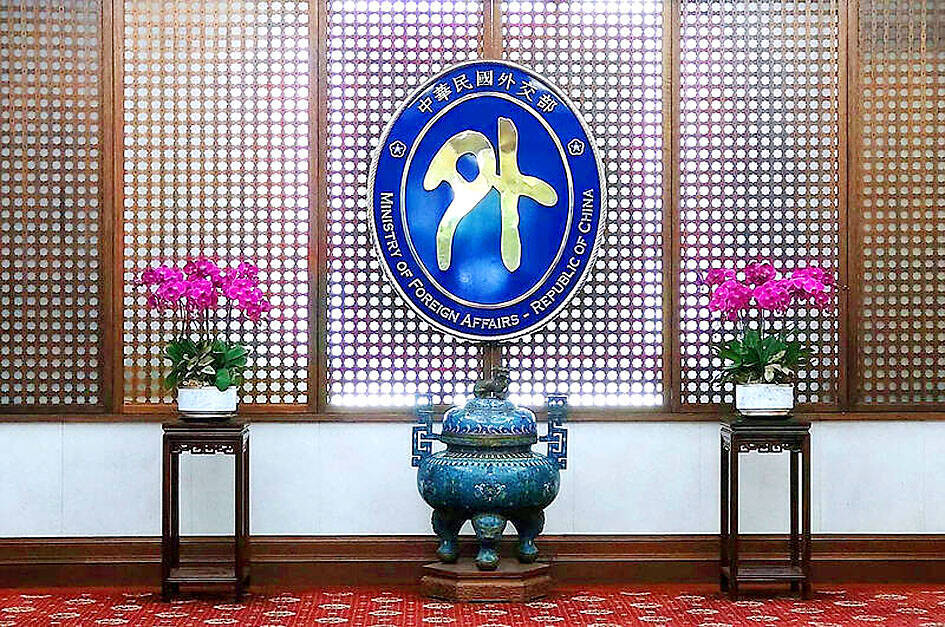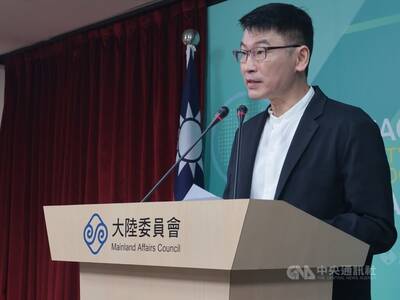The Ministry of Foreign Affairs should, in accordance with the freedom of government information principle, list the expenditures of its confidential budget proposal, which is the highest in six years, the Legislative Yuan’s Budget Center said.
The ministry proposed a “diplomatic spending confidential budget” of NT$1,821,387,000 (US$56.71 million) for next year, which is NT$634.669 million, or 53.48 percent, more than this year’s NT$1,186,718,000, the center said.
It is also NT$1,070,230,000, or 142.48 percent, more than the financial statement for confidential spending for last year, which was NT$751,157,000, it said.

Photo: Yang Cheng-yu, Taipei Times
The ministry diplomatic spending confidential budgets proposed between 2020 and for next year ranged between NT$1,000,266,000 and NT$1,821,387,000, and although the amounts fluctuated from year to year, next year’s budget would be a significant increase, it said.
The confidential budget for next year, the highest in six years, would account for 6.01 percent of the ministry’s total annual budget, the center said.
The ministry said the use of the confidential budget would be in compliance with the Enforcement Rules of the Classified National Security Information Protection Act’s (國家機密保護法施行細則) articles 5 to 7.
The articles identify the circumstances in which government data can be classified to avoid “exceptionally grave damage,” “serious damage” or “identifiable damage,” which includes “a termination of the diplomatic relations or substantive foreign relations,” “a disruption or sabotage of the consultation, agreement, negotiation or cooperation with other countries,” or the enhancement of other countries’ capability or the diminishment in Taiwan’s capability to collect, analyze, process or utilize intelligence information.
Classified information should not be the norm and there is a lot of leeway for interpreting the act, the center said, adding that the public has previously speculated of the ministry’s confidential budget and criticized it for avoiding public scrutiny.
In compliance with the freedom of government information principle and to avoid controversy, the ministry should list its expenditures, allowing the information to be scrutinized objectively, and ensuring that government resources are regulated and monitored, as well as to protect the public’s right to know how the government is spending their tax dollars, it said.
Citing the Legislative Yuan’s passage of amendments last year to the Classified National Security Information Protection Act (國家機密保護法) that no longer allow the indefinite classification of information, the center said the ministry has still not declassified many documents as of this month.
Under the act, information classified before 2003 should be reassigned as classified before Oct.1, 2005, and those that were not reassigned must be declassified.
Of the ministry’s 47,978 books classified before 2003, only 2,663 books were reassigned, while the remaining 45,315 books have not been declassified or reassigned for more than 17 years, the center said.

ENDORSING TAIWAN: Honduran presidential candidate Nasry Afura said that Honduras was ‘100 times better off’ when it was allied with Taipei The Ministry of Foreign Affairs yesterday said it would explore the possibility of restoring diplomatic relations with Honduras based on the principle of maintaining national interests and dignity. The ministry made the remarks in response to reporters’ questions regarding an article titled: “Will Taiwan Regain a Diplomatic Ally?” published in The Diplomat on Saturday. The article said Honduras’ presidential election in November could offer Taiwan the chance to regain an ally, as multiple candidates have promoted re-establishing diplomatic relations with Taiwan. Honduras severed diplomatic ties with Taiwan in March 2023 in favor of Beijing, but since switching its diplomatic recognition,

A fourth public debate was held today about restarting the recently decommissioned Ma-anshan Nuclear Power Plant, ahead of a referendum on the controversial issue to be held in less than two weeks. A referendum on Aug. 23 is to ask voters if they agree that “the Ma-anshan Nuclear Power Plant should continue operations upon approval by the competent authority and confirmation that there are no safety concerns.” Anyone over 18 years of age can vote in the referendum. The vote comes just three months after its final reactor shut down, officially making Taiwan nuclear-free. Taiwan People’s Party Chairman Huang Kuo-chang (黃國昌) represented

Scoot announced yesterday that starting in October, it would increase flights between Taipei and Japan’s Narita airport and Hokkaido, and between Singapore and Taipei. The low-cost airline, a subsidiary of Singapore Airlines, also said it would launch flights to Chiang Rai in Thailand, Okinawa and Tokyo’s Haneda airport between December and March next year. Flights between Singapore and Chiang Rai would begin on Jan. 1, with five flights per week operated by an Embraer E190-E2 aircraft, Scoot said. Flights between Singapore and Okinawa would begin on Dec. 15, with three flights per week operated by Airbus A320 aircraft, the airline said. Services between Singapore

The Mainland Affairs Council (MAC) yesterday announced a ban on all current and former government officials from traveling to China to attend a military parade on Sept. 3, which Beijing is to hold to mark the 80th anniversary of the end of the Second Sino-Japanese War. "This year marks the 80th anniversary of the end of World War II and the Republic of China’s victory in the War of Resistance [Against Japan]," MAC Deputy Minister and spokesperson Liang Wen-chieh (梁文傑) told a regular news briefing in Taipei. To prevent Beijing from using the Sept. 3 military parade and related events for "united